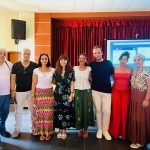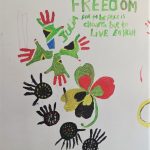The third meeting of the PISTE project, held on July 17th, 2023, brought together various local and sub-local stakeholders, including professionals from social services and the mayor’s office of Voios Municipality, teachers from the local intercultural public school, local citizens, employees from the shelter, PISTE project partners, and six unaccompanied girls who are beneficiaries of the project. The meeting aimed to discuss the development of an integration policy experiment applied to the shelter and review the progress made so far. The meeting began with a brief presentation of the project’s objectives and a summary of the previous meetings (LNPP1 and 2). The focus then shifted to analyzing the planned activities, the methodology of the experiment, and the project’s sustainability.
The majority of the planned activities are related to the arts, including creative writing, dancing, doll making, etc. The professionals at the shelter highlighted the significance of these activities as they address crucial aspects such as human rights, body boundaries, and body and health care. The activities are designed based on the ‘principle of rehabilitation’ aiming to assist the unaccompanied girls in dealing with possible psychological effects or trauma resulting from their experiences. Besides psychosocial support, these activities also aim to help the girls assimilate into the new culture and acquire skills that would facilitate their smooth integration into the host society. One particularly appealing activity the residents of the shelter mentioned is ‘Writing a CV’ which indicates their interest and concerns for the next day. This activity helps the girls develop skills to effectively present themselves and their experiences, which can be crucial in their pursuit of future opportunities.
Sustainability is a significant concern for the stakeholders involved in the project. They agreed that submitting a joint proposal from the Shelter for Unaccompanied Minors and the Municipality of Voios to the Region of Western Macedonia for funding is essential to ensure the continuity of the project’s efforts. Furthermore, the participants discussed the importance of better formalizing the local network with other shelters in the wider area. This network would serve as a platform for sharing good practices and providing community-building opportunities for unaccompanied minors. Such collaborations with other shelters and stakeholders can only improve the social life of the children residing at the shelter and has the potential to enhance their integration possibilities. Overall, the participants of the third meeting of the PISTE project were happy with the progress of the experiment which complements relevant activities for the well-being and successful integration of unaccompanied refugee minors in Voios Municipality. By providing them with a supportive framework, guidance, and opportunities to explore their interests and skills, the project aims to empower the girls to make informed decisions about their future careers and lives.







